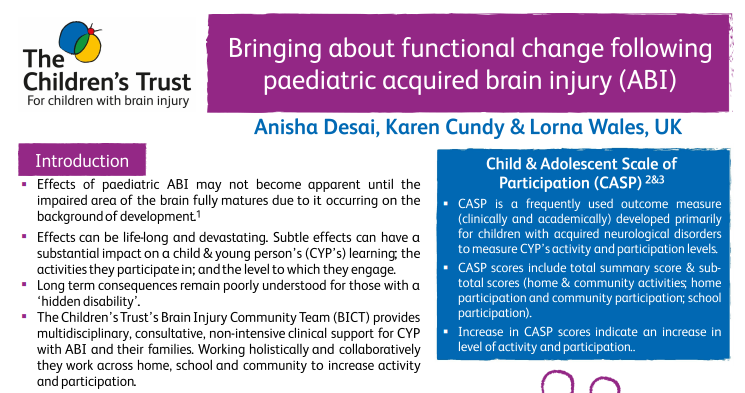Research team recent publications
Book chapters
Psychological Therapy for Paediatric Acquired Brain Injury The book is Edited by Jenny Jim and Esther Cole with chapters by Jenny, Alison Perkins, Laura Carroll, Elizabeth Roberts and Gemma Costello
Alison Perkins has had a chapter printed in Meredith, K. H., & Yeates, G. N. (Eds.). (2019). Psychotherapy and Aphasia: Interventions for Emotional Wellbeing and Relationships. Routledge.
Jonathan Pool and Claire Woods have contributed a chapter ‘Music therapy in paediatric neurorehabilitation’ to the Oxford Handbook of Early Childhood Music Learning and Development (OHECMLD).
Journal articles
Wales L, Davis K, Kelly G, Lynott H (2021). Long Term Participation Outcomes for Severe Acquired Brain Injury in Childhood - An Expanded Scoping Review. Dev Neurorehabil. Feb 20:1-9. doi: 10.1080/17518423.2021.1886191.
Forsyth R, Hamilton C, Ingram M, Kelly G, Grove T, Wales L, Gilthorpe MS. Demonstration of functional rehabilitation treatment effects in children and young people after severe acquired brain injury. Dev Neurorehabil. 2021 Aug 31:1-7. doi: 10.1080/17518423.2021.1964631. Epub ahead of print. PMID: 34463178.
Palanivel V and Burrough M (2021) Acquired brain injury in children, and their rehabilitation: where we are now? Paediatrics and Child health DOI:https://doi.org/10.1016/j.paed.2021.02.001
Baker FA, Pool J, Johansson K et al (2021) Strategies for Recruiting People With Dementia to Music Therapy Studies: Systematic Review, Journal of Music Therapy https://doi.org/10.1093/jmt/thab010
Pool JW, Siegert RJ, Taylor S, et al (2020). Evaluating the validity, reliability and clinical utility of the Music therapy Sensory Instrument for Cognition, Consciousness and Awareness (MuSICCA): protocol of a validation study. BMJ Open doi: 10.1136/bmjopen-2020-039713
Costello G and Bennett E (2020) From politics to the playground: Putting childhood-acquired brain injury on the timetable. Nasen Connect Available at https://ukabif.org.uk/news/521464/From-politics-to-the-playground-Putti…
Burrough M, Beanlands C and Sugarhood P (2020) Experiences of Using Pathways and Resources for Engagement and Participation (PREP) Intervention for Children with Acquired Brain Injury: A Knowledge Translation Study Int J Environ Res Public Health; 17(23):8736. doi: 10.3390/ijerph17238736
Buckeridge K, Clarke C and Sellers D (2020) Adolescents’ experiences of communication following acquired brain injury. International Journal of Language & Communication Disorders, 55: 97-109. https://doi.org/10.1111/1460-6984.12506
Wales, L., Dunford, C., & Davis, K. (2020). Following severe childhood stroke, specialised residential rehabilitation improves self-care independence but there are ongoing needs at discharge. British Journal of Occupational Therapy. https://doi.org/10.1177/0308022619894870
Wilkinson D, Bate C, Viera M, Stothard C, Corkett R, Mills H (2020) Augmentative and Alternative Communication provision pathway: single item activation to linking ideas and navigating. Communication Matters
Gan C, Wright FV. Development of the family needs questionnaire - pediatric version [FNQ-P] - phase I. Brain Injury. 2019 ;33(5):623-632. DOI: 10.1080/02699052.2019.1566836. PMID: 30676093.
Kelly G, Moys R, Burrough M, Hyde S, Wales L (2020) Rehabilitation in Practice: Improving Delivery of Upper Limb Rehabilitation for Children and Young People with Acquired Brain Injuries through the Development and Implementation of a Clinical Pathway. Disability and Rehabilitation early online

